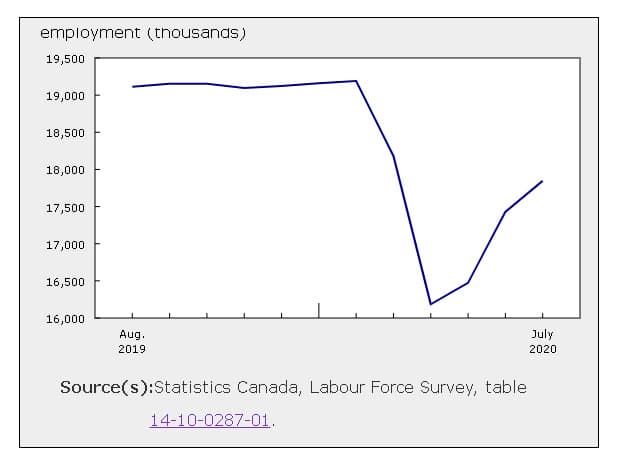
Canada’s economy is on the upswing for the third month in a row.
Canada is seeing some economic recovery as coronavirus restrictions ease throughout the country.
About 55 per cent of the 3 million jobs lost since April were recouped as of July, according to the Labour Force Survey.
About 419,000 jobs were added in July, a 2.4 per cent increase over the previous month. The growth was slower compared to June’s growth rate at 5.8 per cent. Statistics Canada’s recent survey on employment, payroll, and hours found that the economic downturn from coronavirus is seeing a sharp turnaround after a steep downfall.
Most of the jobs gained were in part-time work. There were 345,000 part-time positions filled in July, compared to 73,000 full-time jobs.
More women were hired than men in July, however, women are still not as close to pre-COVID employment levels as men. Women, racialized people, LGBTQ2S+, and immigrants have been disproportionately affected by the pandemic.

Source: Statistics Canada
Employment levels for immigrants and visible minorities
Unemployment fell to 10.9 per cent, however, there are still 2.2 million unemployed people in Canada. The unemployment rate for people ages 15 to 69 was 11.3 per cent, a figure that was not adjusted to reflect the seasonal changes in employment.
Several visible minority groups had significantly higher rates of joblessness, such as South Asian (17.8 per cent), Arab (17.3 per cent), and Black (16.8 per cent) Canadians. Statistics Canada suggested the higher unemployment rate of visible minorities could be due to their higher concentration in hard-hit industries such as food services and retail.
Very recent immigrants saw an uptick in employment. People who landed in Canada within the past five years saw a rise in employment of 2.1 per cent for the third consecutive month. Statistics Canada attributed this trend to fewer numbers of new immigrants coming to Canada in recent months. Canada admitted 19,000 new permanent residents in June, which is down from the 34,000 new immigrants who were admitted at the same time last year. Similar data on new permanent residents admitted in July will be available next month.
Pace of recovery varies
Employment increased in all provinces except for New Brunswick, which was unchanged month over month but was at 96.6 per cent of its February levels.
Though employment increased faster for low-wage employees, they were only at 85.4 per cent of February levels compared to other workers who were at 97.4 per cent in July.
Statistics Canada’s Labour Force Survey
Every month Statistics Canada conducts an extensive survey to evaluate Canadian labour force data.
The latest Labour Force Survey results reflected the conditions between July 12 to 18. Businesses and workplaces across Canada were continuing to re-open. Though coronavirus measures were being scaled back, social distancing requirements and restrictions on large gatherings remained in place. In late June, Canada extended travel restrictions on international travellers through July, as part of its efforts to stop the spread of coronavirus.
This labour force survey was unique in that it included information on the labour market conditions of visible minorities.
“Through the addition of a new survey question and the introduction of new statistical methods, the LFS is now able to more fully determine the impact of the COVID-19 economic shutdown on diverse groups of Canadians,” Statistics Canada says in July’s survey.